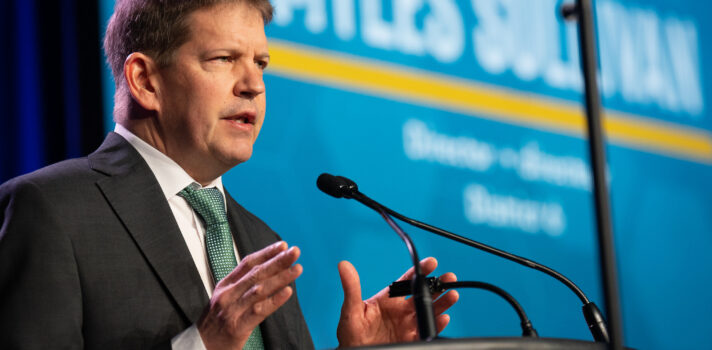
HAMILTON – With job losses already a reality, United Steelworkers union (USW) representatives met today in Hamilton to underscore the urgency of a national program to protect Canadian workers from the Trump administration’s threats of devastating, unprecedented tariffs.
USW members from five manufacturing and steel plants in Hamilton and the nearby community of Nanticoke held a roundtable discussion this morning with federal New Democratic Party Leader Jagmeet Singh regarding the decisive measures needed to counter Trump’s tariffs threat.
“We can’t afford to stand idly by while President Trump uses tariffs to hurt workers here. We need to fight back and be ready for the worst-case scenario,” said Kevon Stewart, USW District 6 Director, representing tens of thousands of union members in Ontario and Atlantic Canada.
“Our governments must act now to secure protections for steelworkers and all Canadian workers likely to be affected, as well as the industries they support. We need a comprehensive response,” Stewart said.
Trump’s latest threats include unjustifiable 50% tariffs on Canadian steel and aluminum exports to the U.S., Stewart noted.
“Last week, President Trump took another dangerous step that escalates the trade conflict between the U.S. and Canada, by signing a proclamation imposing a 25% tariff on all U.S. imports of steel and aluminum,” he said.
“These tariffs will stack on top of the 25% tariffs already in place on all Canadian exports, which were temporarily delayed for 30 days. Let us be clear – this has nothing to do with fair trade. It’s about politics, and Canadian workers and industries – like the steel sector – will feel the impact.”
The USW has long advocated for mandating the use of Canadian steel in domestic infrastructure projects and supports the NDP’s Build Canadian Buy Canadian plan for a massive job-creating public infrastructure program that would require the use of Canadian content, including Canadian steel, in all projects.
“Through direct investment and transfers to provinces, we can flow funding for new homes, hospitals, highways, bridges and more, and require that every foot of steel in those projects is Canadian steel, made by Canadian steelworkers,” Singh said at today’s meeting with USW members.
The NDP plan also commits to implementing longstanding USW policy proposals such as increasing Employment Insurance (EI) benefits and expanding the EI work-sharing program that helps employers avoid layoffs.
The chaos and uncertainty created by Trump’s tariffs threats have already led to layoffs for USW members, notably hundreds of workers at Hamilton’s National Steel Car plant which manufactures rail cars – the majority of which are exported to the U.S.
“About 90% of our workforce was laid off before Christmas and right now we’re at roughly 50%, so we still have several hundred members who are off work,” said Frank Crowder, President of USW Local 7135, which represents 1,400 workers at National Steel Car.
“We go through cycles where there are temporary layoffs, but this is different. It’s not one of those normal cycles. This is related to the tariff threats and the uncertainty, and we don’t know what to expect. We need the uncertainty to stop,” Crowder said.
A national plan supported by all governments must be rolled out immediately to counter Trump’s tariff threats and provide crucial supports for workers, families and communities across Canada, Stewart said.
“The steel industry is a true pillar of the Canadian economy. It supports thousands of good-paying jobs and sustains entire communities from coast to coast,” he said. “When steel workers lose their jobs, their families and entire communities feel the pain.”
About the United Steelworkers union
The USW represents 225,000 members in nearly every economic sector across Canada and is the largest private-sector union in North America, with 850,000 members in Canada, the United States and the Caribbean.
Each year, thousands of workers choose to join the USW because of the union’s strong track record in creating healthier, safer and more respectful workplaces and negotiating better working conditions and fairer compensation – including good wages, benefits and pensions.
Share on Facebook Share on Twitter

